Business Communication Module: Emotional Intelligence Report Analysis
VerifiedAdded on 2019/11/26
|7
|1471
|225
Report
AI Summary
This report examines the concept of emotional intelligence (EI) within the context of business communication. It begins by defining EI and its core components: emotional awareness, harnessing emotion, and applying these skills to critical thinking and problem-solving. The report then reflects on the author's personal interest in EI, emphasizing self-awareness and emotional regulation as key aspects. Furthermore, it explores the practical application of EI in present and future professional careers, highlighting the four quadrants of EI: self-awareness, self-management, social awareness, and relationship management. The report also discusses the importance of team leadership and the role of EI in motivating and managing teams effectively. It concludes by emphasizing the need for continuous self-assessment and improvement in areas such as self-awareness and relationship-building skills to enhance team leadership capabilities. The report includes a comprehensive reference list of relevant academic sources.
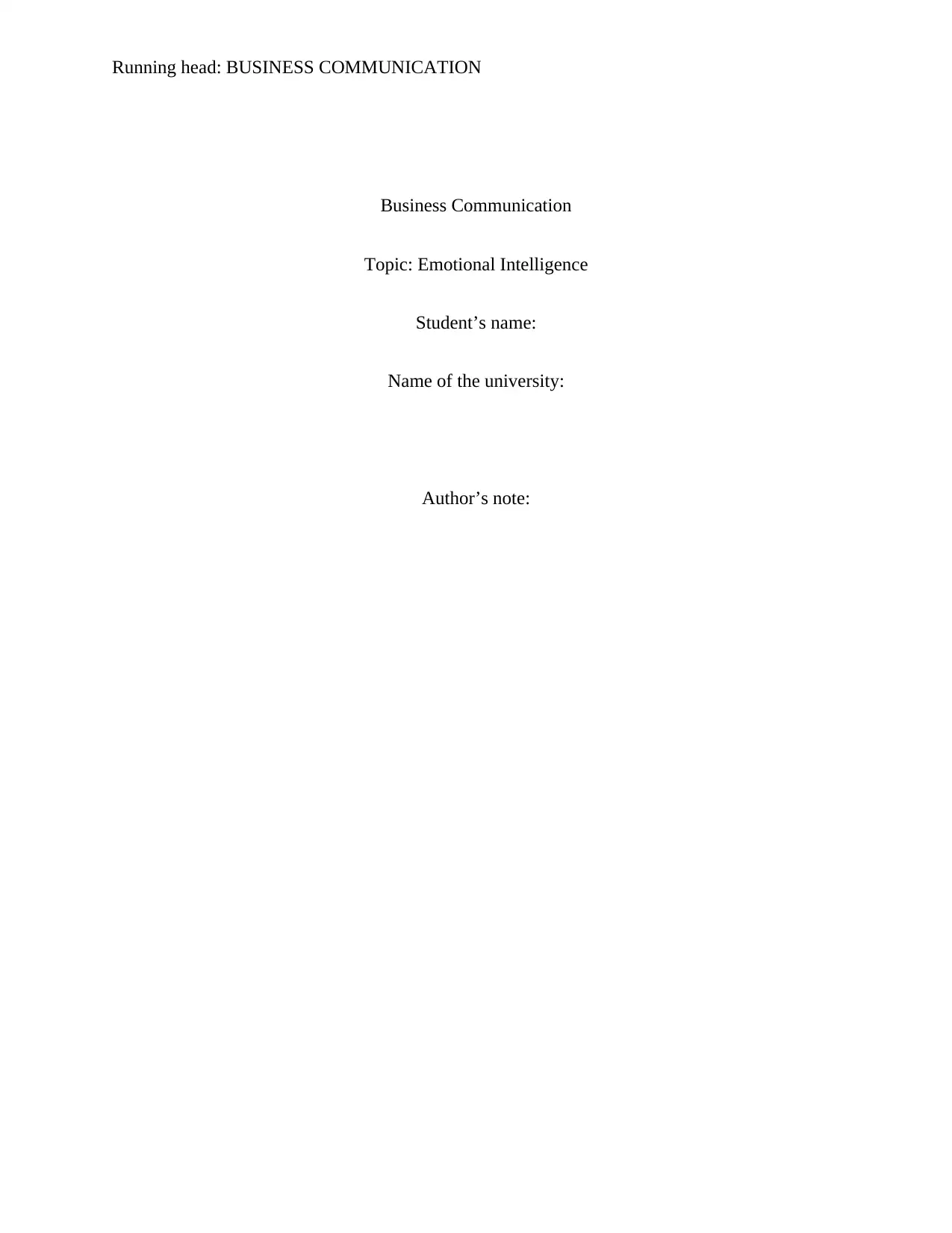
Running head: BUSINESS COMMUNICATION
Business Communication
Topic: Emotional Intelligence
Student’s name:
Name of the university:
Author’s note:
Business Communication
Topic: Emotional Intelligence
Student’s name:
Name of the university:
Author’s note:
Paraphrase This Document
Need a fresh take? Get an instant paraphrase of this document with our AI Paraphraser
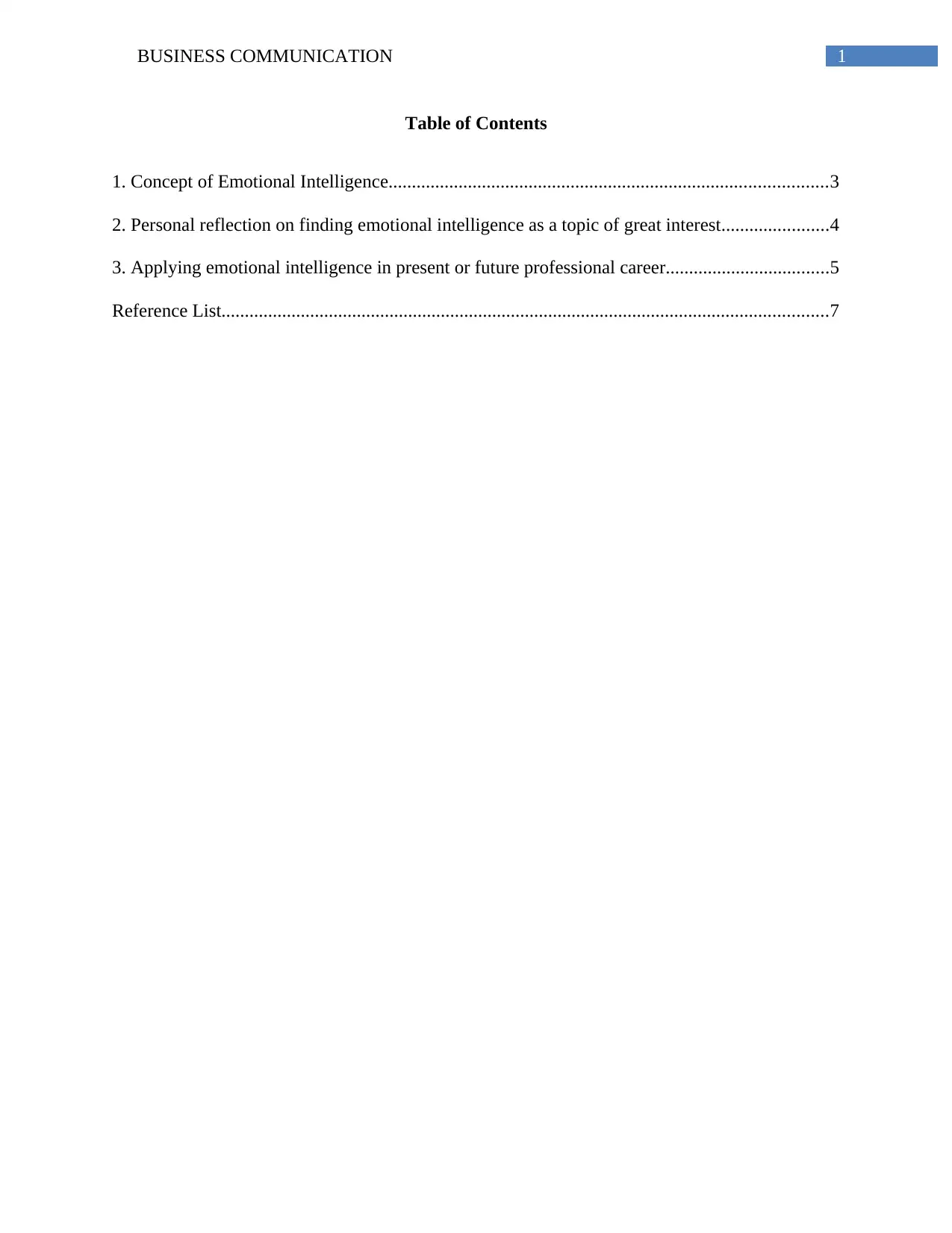
1BUSINESS COMMUNICATION
Table of Contents
1. Concept of Emotional Intelligence..............................................................................................3
2. Personal reflection on finding emotional intelligence as a topic of great interest.......................4
3. Applying emotional intelligence in present or future professional career...................................5
Reference List..................................................................................................................................7
Table of Contents
1. Concept of Emotional Intelligence..............................................................................................3
2. Personal reflection on finding emotional intelligence as a topic of great interest.......................4
3. Applying emotional intelligence in present or future professional career...................................5
Reference List..................................................................................................................................7
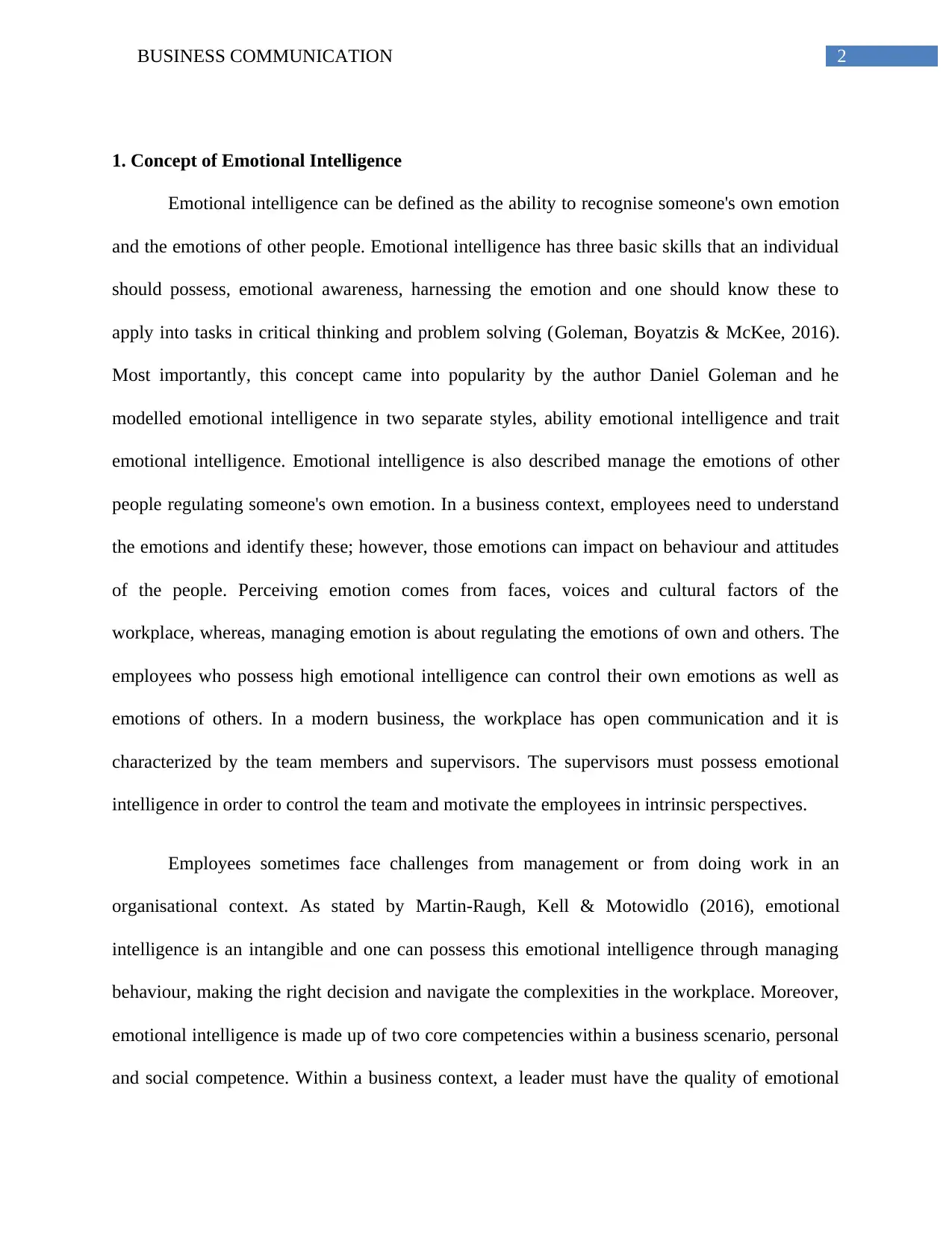
2BUSINESS COMMUNICATION
1. Concept of Emotional Intelligence
Emotional intelligence can be defined as the ability to recognise someone's own emotion
and the emotions of other people. Emotional intelligence has three basic skills that an individual
should possess, emotional awareness, harnessing the emotion and one should know these to
apply into tasks in critical thinking and problem solving (Goleman, Boyatzis & McKee, 2016).
Most importantly, this concept came into popularity by the author Daniel Goleman and he
modelled emotional intelligence in two separate styles, ability emotional intelligence and trait
emotional intelligence. Emotional intelligence is also described manage the emotions of other
people regulating someone's own emotion. In a business context, employees need to understand
the emotions and identify these; however, those emotions can impact on behaviour and attitudes
of the people. Perceiving emotion comes from faces, voices and cultural factors of the
workplace, whereas, managing emotion is about regulating the emotions of own and others. The
employees who possess high emotional intelligence can control their own emotions as well as
emotions of others. In a modern business, the workplace has open communication and it is
characterized by the team members and supervisors. The supervisors must possess emotional
intelligence in order to control the team and motivate the employees in intrinsic perspectives.
Employees sometimes face challenges from management or from doing work in an
organisational context. As stated by Martin-Raugh, Kell & Motowidlo (2016), emotional
intelligence is an intangible and one can possess this emotional intelligence through managing
behaviour, making the right decision and navigate the complexities in the workplace. Moreover,
emotional intelligence is made up of two core competencies within a business scenario, personal
and social competence. Within a business context, a leader must have the quality of emotional
1. Concept of Emotional Intelligence
Emotional intelligence can be defined as the ability to recognise someone's own emotion
and the emotions of other people. Emotional intelligence has three basic skills that an individual
should possess, emotional awareness, harnessing the emotion and one should know these to
apply into tasks in critical thinking and problem solving (Goleman, Boyatzis & McKee, 2016).
Most importantly, this concept came into popularity by the author Daniel Goleman and he
modelled emotional intelligence in two separate styles, ability emotional intelligence and trait
emotional intelligence. Emotional intelligence is also described manage the emotions of other
people regulating someone's own emotion. In a business context, employees need to understand
the emotions and identify these; however, those emotions can impact on behaviour and attitudes
of the people. Perceiving emotion comes from faces, voices and cultural factors of the
workplace, whereas, managing emotion is about regulating the emotions of own and others. The
employees who possess high emotional intelligence can control their own emotions as well as
emotions of others. In a modern business, the workplace has open communication and it is
characterized by the team members and supervisors. The supervisors must possess emotional
intelligence in order to control the team and motivate the employees in intrinsic perspectives.
Employees sometimes face challenges from management or from doing work in an
organisational context. As stated by Martin-Raugh, Kell & Motowidlo (2016), emotional
intelligence is an intangible and one can possess this emotional intelligence through managing
behaviour, making the right decision and navigate the complexities in the workplace. Moreover,
emotional intelligence is made up of two core competencies within a business scenario, personal
and social competence. Within a business context, a leader must have the quality of emotional
⊘ This is a preview!⊘
Do you want full access?
Subscribe today to unlock all pages.

Trusted by 1+ million students worldwide
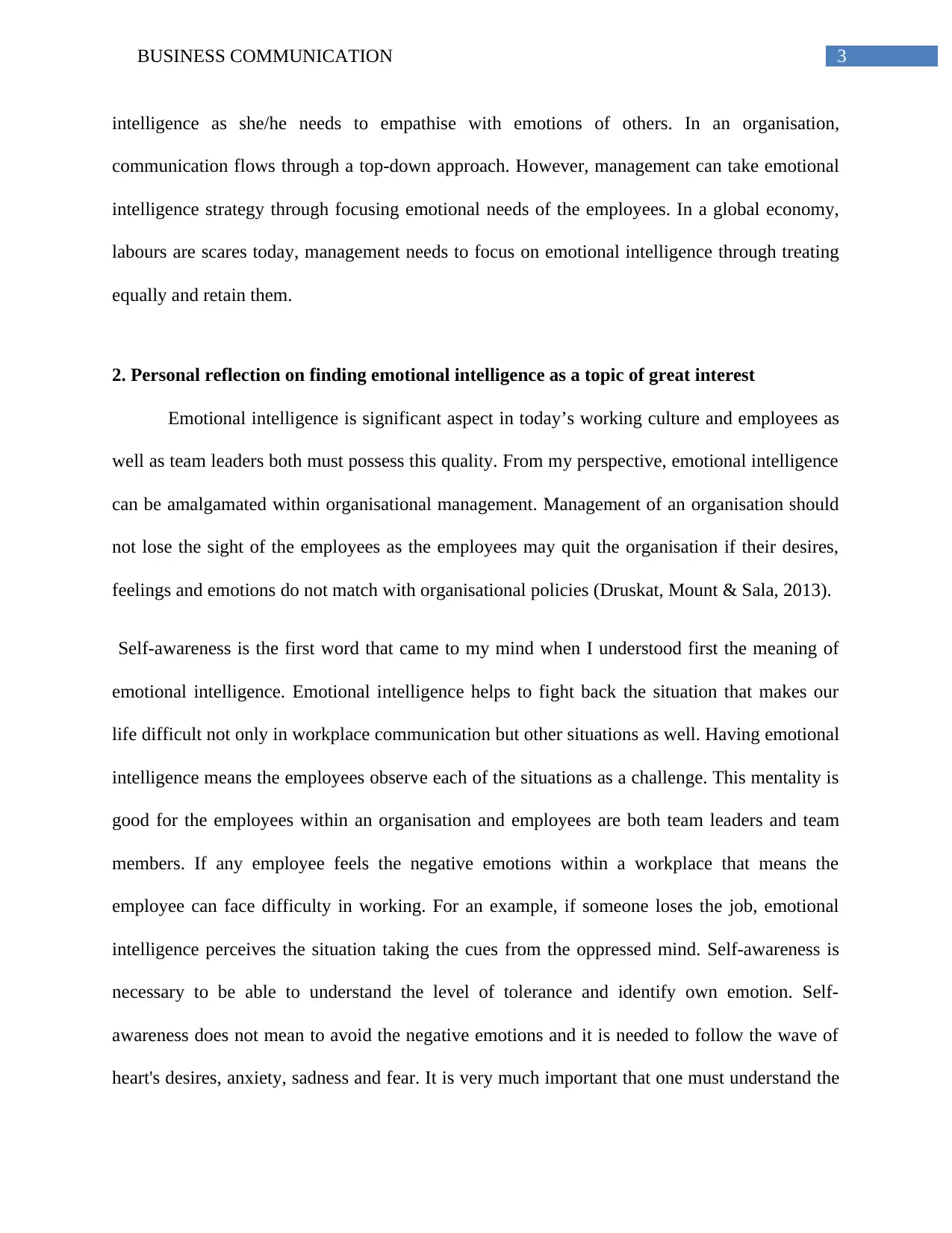
3BUSINESS COMMUNICATION
intelligence as she/he needs to empathise with emotions of others. In an organisation,
communication flows through a top-down approach. However, management can take emotional
intelligence strategy through focusing emotional needs of the employees. In a global economy,
labours are scares today, management needs to focus on emotional intelligence through treating
equally and retain them.
2. Personal reflection on finding emotional intelligence as a topic of great interest
Emotional intelligence is significant aspect in today’s working culture and employees as
well as team leaders both must possess this quality. From my perspective, emotional intelligence
can be amalgamated within organisational management. Management of an organisation should
not lose the sight of the employees as the employees may quit the organisation if their desires,
feelings and emotions do not match with organisational policies (Druskat, Mount & Sala, 2013).
Self-awareness is the first word that came to my mind when I understood first the meaning of
emotional intelligence. Emotional intelligence helps to fight back the situation that makes our
life difficult not only in workplace communication but other situations as well. Having emotional
intelligence means the employees observe each of the situations as a challenge. This mentality is
good for the employees within an organisation and employees are both team leaders and team
members. If any employee feels the negative emotions within a workplace that means the
employee can face difficulty in working. For an example, if someone loses the job, emotional
intelligence perceives the situation taking the cues from the oppressed mind. Self-awareness is
necessary to be able to understand the level of tolerance and identify own emotion. Self-
awareness does not mean to avoid the negative emotions and it is needed to follow the wave of
heart's desires, anxiety, sadness and fear. It is very much important that one must understand the
intelligence as she/he needs to empathise with emotions of others. In an organisation,
communication flows through a top-down approach. However, management can take emotional
intelligence strategy through focusing emotional needs of the employees. In a global economy,
labours are scares today, management needs to focus on emotional intelligence through treating
equally and retain them.
2. Personal reflection on finding emotional intelligence as a topic of great interest
Emotional intelligence is significant aspect in today’s working culture and employees as
well as team leaders both must possess this quality. From my perspective, emotional intelligence
can be amalgamated within organisational management. Management of an organisation should
not lose the sight of the employees as the employees may quit the organisation if their desires,
feelings and emotions do not match with organisational policies (Druskat, Mount & Sala, 2013).
Self-awareness is the first word that came to my mind when I understood first the meaning of
emotional intelligence. Emotional intelligence helps to fight back the situation that makes our
life difficult not only in workplace communication but other situations as well. Having emotional
intelligence means the employees observe each of the situations as a challenge. This mentality is
good for the employees within an organisation and employees are both team leaders and team
members. If any employee feels the negative emotions within a workplace that means the
employee can face difficulty in working. For an example, if someone loses the job, emotional
intelligence perceives the situation taking the cues from the oppressed mind. Self-awareness is
necessary to be able to understand the level of tolerance and identify own emotion. Self-
awareness does not mean to avoid the negative emotions and it is needed to follow the wave of
heart's desires, anxiety, sadness and fear. It is very much important that one must understand the
Paraphrase This Document
Need a fresh take? Get an instant paraphrase of this document with our AI Paraphraser
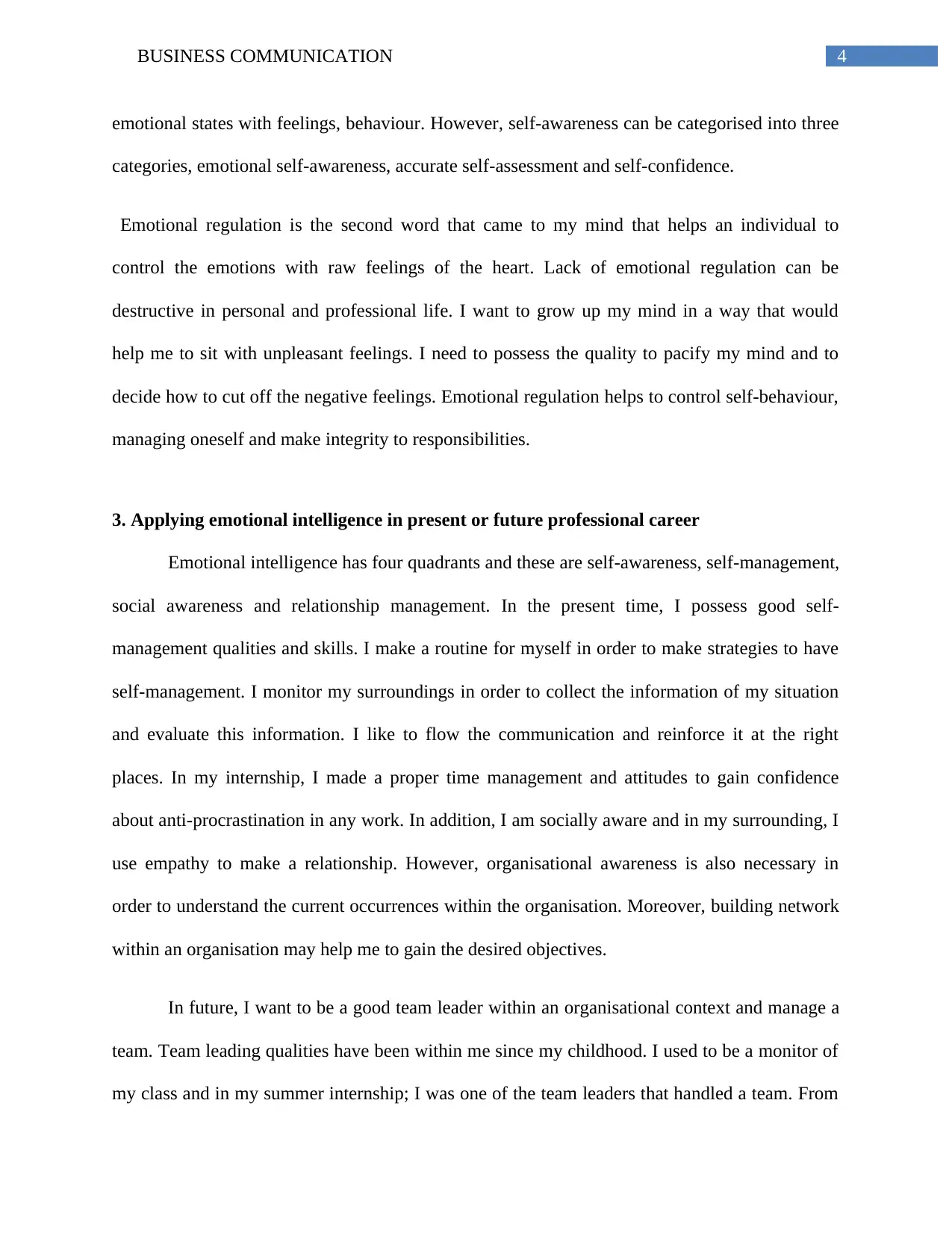
4BUSINESS COMMUNICATION
emotional states with feelings, behaviour. However, self-awareness can be categorised into three
categories, emotional self-awareness, accurate self-assessment and self-confidence.
Emotional regulation is the second word that came to my mind that helps an individual to
control the emotions with raw feelings of the heart. Lack of emotional regulation can be
destructive in personal and professional life. I want to grow up my mind in a way that would
help me to sit with unpleasant feelings. I need to possess the quality to pacify my mind and to
decide how to cut off the negative feelings. Emotional regulation helps to control self-behaviour,
managing oneself and make integrity to responsibilities.
3. Applying emotional intelligence in present or future professional career
Emotional intelligence has four quadrants and these are self-awareness, self-management,
social awareness and relationship management. In the present time, I possess good self-
management qualities and skills. I make a routine for myself in order to make strategies to have
self-management. I monitor my surroundings in order to collect the information of my situation
and evaluate this information. I like to flow the communication and reinforce it at the right
places. In my internship, I made a proper time management and attitudes to gain confidence
about anti-procrastination in any work. In addition, I am socially aware and in my surrounding, I
use empathy to make a relationship. However, organisational awareness is also necessary in
order to understand the current occurrences within the organisation. Moreover, building network
within an organisation may help me to gain the desired objectives.
In future, I want to be a good team leader within an organisational context and manage a
team. Team leading qualities have been within me since my childhood. I used to be a monitor of
my class and in my summer internship; I was one of the team leaders that handled a team. From
emotional states with feelings, behaviour. However, self-awareness can be categorised into three
categories, emotional self-awareness, accurate self-assessment and self-confidence.
Emotional regulation is the second word that came to my mind that helps an individual to
control the emotions with raw feelings of the heart. Lack of emotional regulation can be
destructive in personal and professional life. I want to grow up my mind in a way that would
help me to sit with unpleasant feelings. I need to possess the quality to pacify my mind and to
decide how to cut off the negative feelings. Emotional regulation helps to control self-behaviour,
managing oneself and make integrity to responsibilities.
3. Applying emotional intelligence in present or future professional career
Emotional intelligence has four quadrants and these are self-awareness, self-management,
social awareness and relationship management. In the present time, I possess good self-
management qualities and skills. I make a routine for myself in order to make strategies to have
self-management. I monitor my surroundings in order to collect the information of my situation
and evaluate this information. I like to flow the communication and reinforce it at the right
places. In my internship, I made a proper time management and attitudes to gain confidence
about anti-procrastination in any work. In addition, I am socially aware and in my surrounding, I
use empathy to make a relationship. However, organisational awareness is also necessary in
order to understand the current occurrences within the organisation. Moreover, building network
within an organisation may help me to gain the desired objectives.
In future, I want to be a good team leader within an organisational context and manage a
team. Team leading qualities have been within me since my childhood. I used to be a monitor of
my class and in my summer internship; I was one of the team leaders that handled a team. From
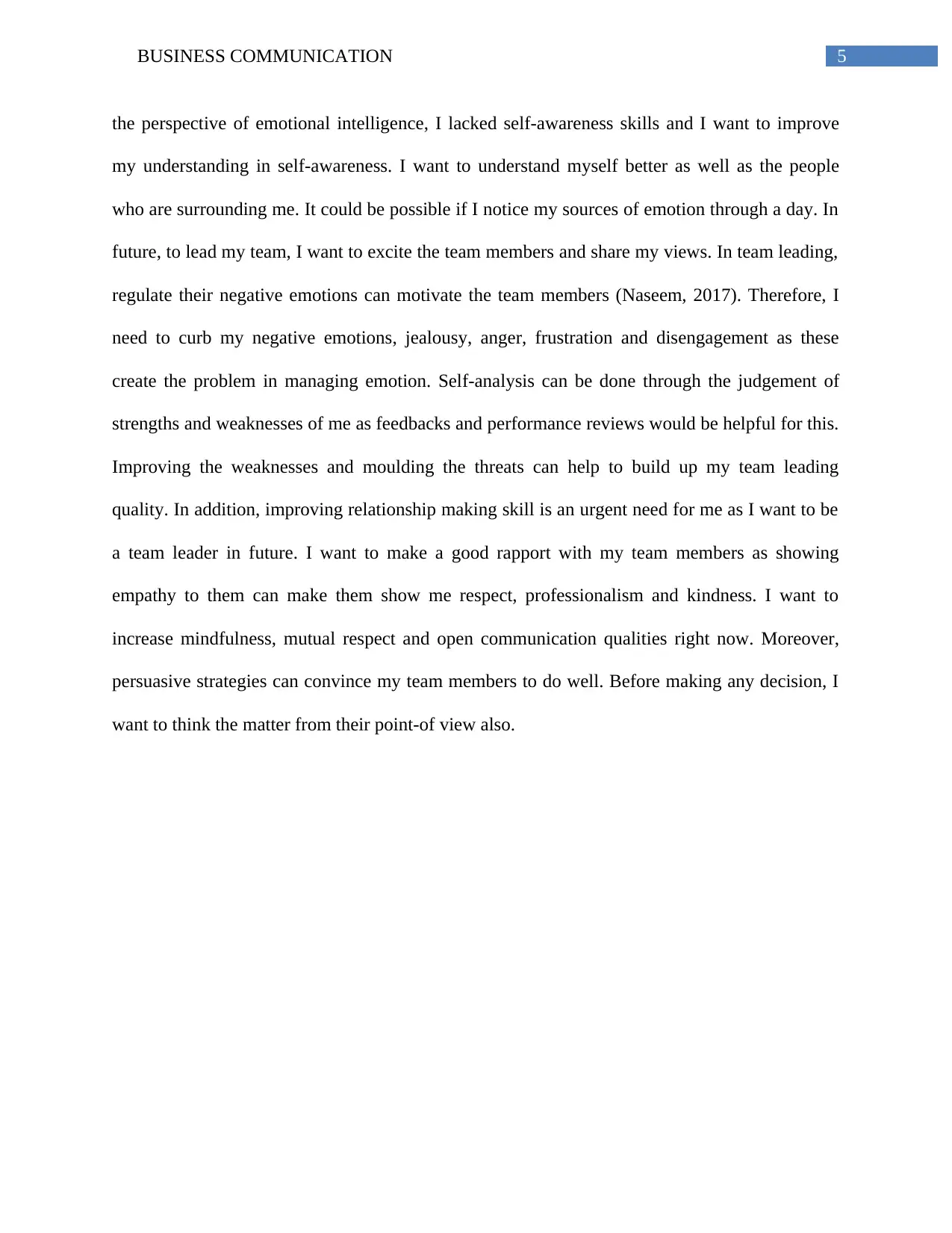
5BUSINESS COMMUNICATION
the perspective of emotional intelligence, I lacked self-awareness skills and I want to improve
my understanding in self-awareness. I want to understand myself better as well as the people
who are surrounding me. It could be possible if I notice my sources of emotion through a day. In
future, to lead my team, I want to excite the team members and share my views. In team leading,
regulate their negative emotions can motivate the team members (Naseem, 2017). Therefore, I
need to curb my negative emotions, jealousy, anger, frustration and disengagement as these
create the problem in managing emotion. Self-analysis can be done through the judgement of
strengths and weaknesses of me as feedbacks and performance reviews would be helpful for this.
Improving the weaknesses and moulding the threats can help to build up my team leading
quality. In addition, improving relationship making skill is an urgent need for me as I want to be
a team leader in future. I want to make a good rapport with my team members as showing
empathy to them can make them show me respect, professionalism and kindness. I want to
increase mindfulness, mutual respect and open communication qualities right now. Moreover,
persuasive strategies can convince my team members to do well. Before making any decision, I
want to think the matter from their point-of view also.
the perspective of emotional intelligence, I lacked self-awareness skills and I want to improve
my understanding in self-awareness. I want to understand myself better as well as the people
who are surrounding me. It could be possible if I notice my sources of emotion through a day. In
future, to lead my team, I want to excite the team members and share my views. In team leading,
regulate their negative emotions can motivate the team members (Naseem, 2017). Therefore, I
need to curb my negative emotions, jealousy, anger, frustration and disengagement as these
create the problem in managing emotion. Self-analysis can be done through the judgement of
strengths and weaknesses of me as feedbacks and performance reviews would be helpful for this.
Improving the weaknesses and moulding the threats can help to build up my team leading
quality. In addition, improving relationship making skill is an urgent need for me as I want to be
a team leader in future. I want to make a good rapport with my team members as showing
empathy to them can make them show me respect, professionalism and kindness. I want to
increase mindfulness, mutual respect and open communication qualities right now. Moreover,
persuasive strategies can convince my team members to do well. Before making any decision, I
want to think the matter from their point-of view also.
⊘ This is a preview!⊘
Do you want full access?
Subscribe today to unlock all pages.

Trusted by 1+ million students worldwide
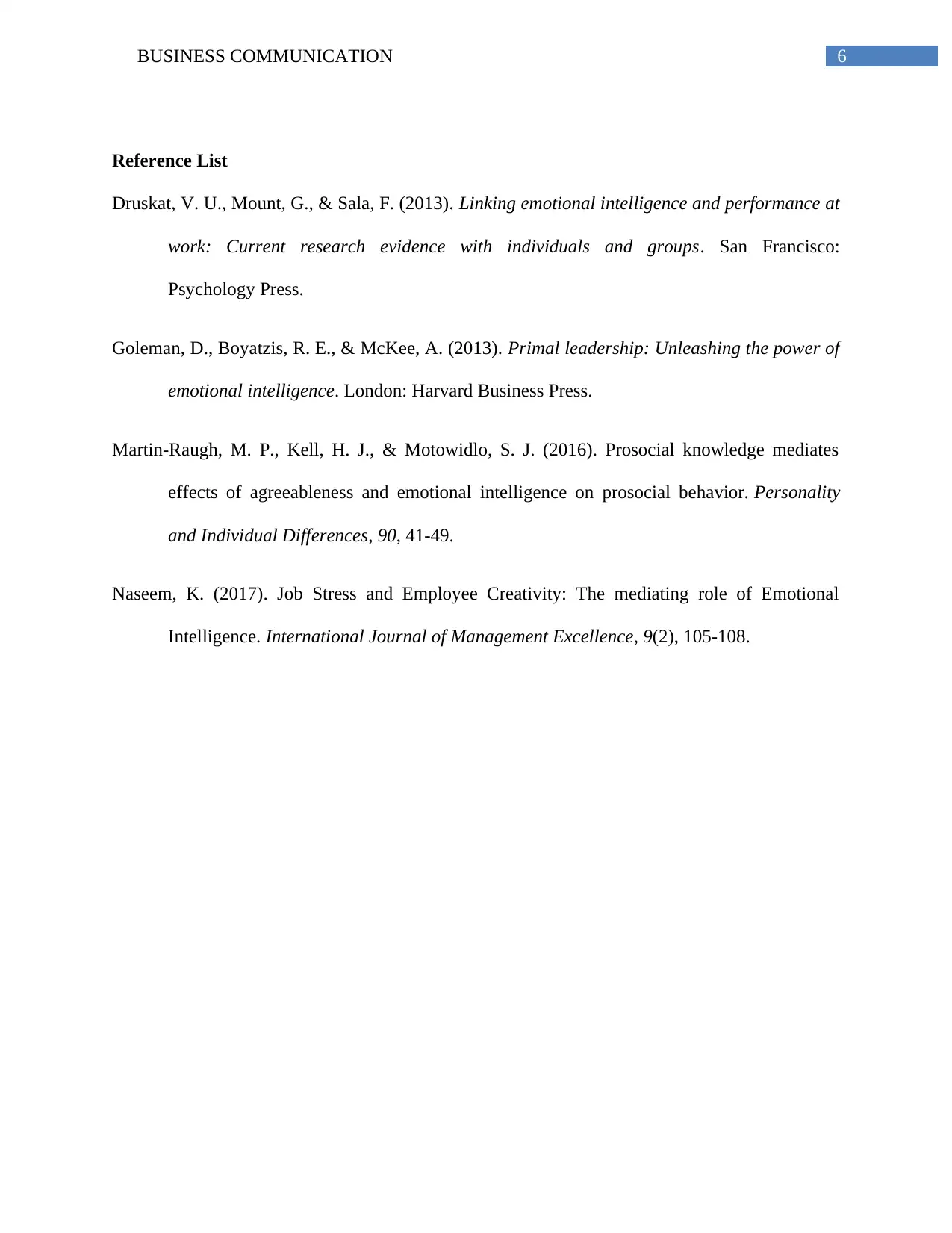
6BUSINESS COMMUNICATION
Reference List
Druskat, V. U., Mount, G., & Sala, F. (2013). Linking emotional intelligence and performance at
work: Current research evidence with individuals and groups. San Francisco:
Psychology Press.
Goleman, D., Boyatzis, R. E., & McKee, A. (2013). Primal leadership: Unleashing the power of
emotional intelligence. London: Harvard Business Press.
Martin-Raugh, M. P., Kell, H. J., & Motowidlo, S. J. (2016). Prosocial knowledge mediates
effects of agreeableness and emotional intelligence on prosocial behavior. Personality
and Individual Differences, 90, 41-49.
Naseem, K. (2017). Job Stress and Employee Creativity: The mediating role of Emotional
Intelligence. International Journal of Management Excellence, 9(2), 105-108.
Reference List
Druskat, V. U., Mount, G., & Sala, F. (2013). Linking emotional intelligence and performance at
work: Current research evidence with individuals and groups. San Francisco:
Psychology Press.
Goleman, D., Boyatzis, R. E., & McKee, A. (2013). Primal leadership: Unleashing the power of
emotional intelligence. London: Harvard Business Press.
Martin-Raugh, M. P., Kell, H. J., & Motowidlo, S. J. (2016). Prosocial knowledge mediates
effects of agreeableness and emotional intelligence on prosocial behavior. Personality
and Individual Differences, 90, 41-49.
Naseem, K. (2017). Job Stress and Employee Creativity: The mediating role of Emotional
Intelligence. International Journal of Management Excellence, 9(2), 105-108.
1 out of 7
Related Documents
Your All-in-One AI-Powered Toolkit for Academic Success.
+13062052269
info@desklib.com
Available 24*7 on WhatsApp / Email
![[object Object]](/_next/static/media/star-bottom.7253800d.svg)
Unlock your academic potential
Copyright © 2020–2026 A2Z Services. All Rights Reserved. Developed and managed by ZUCOL.





